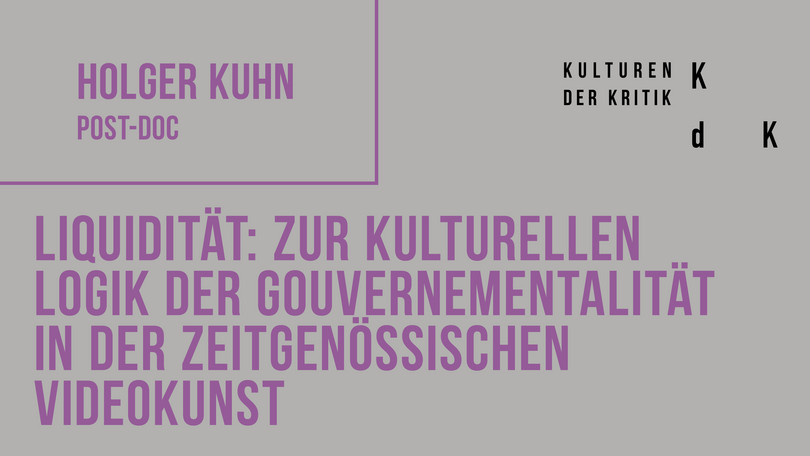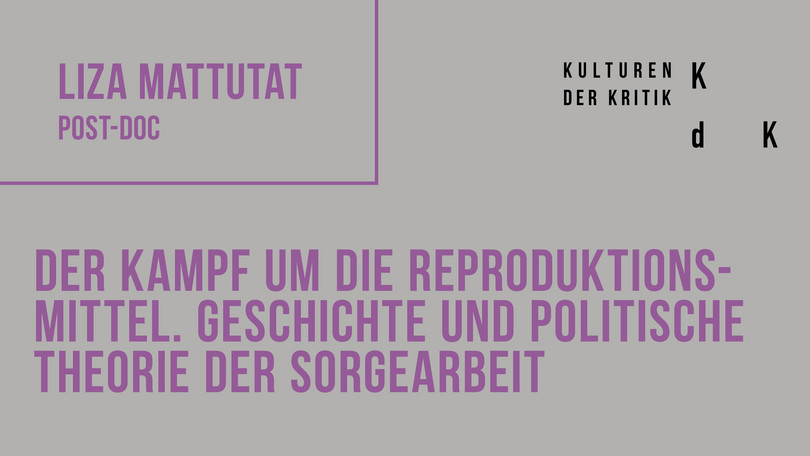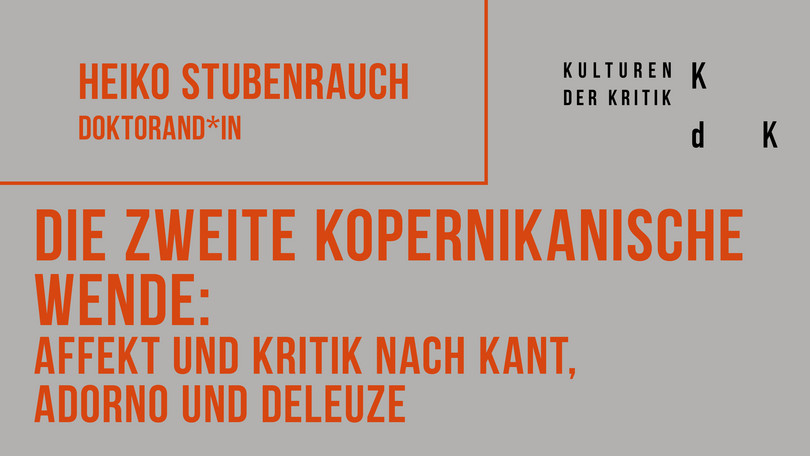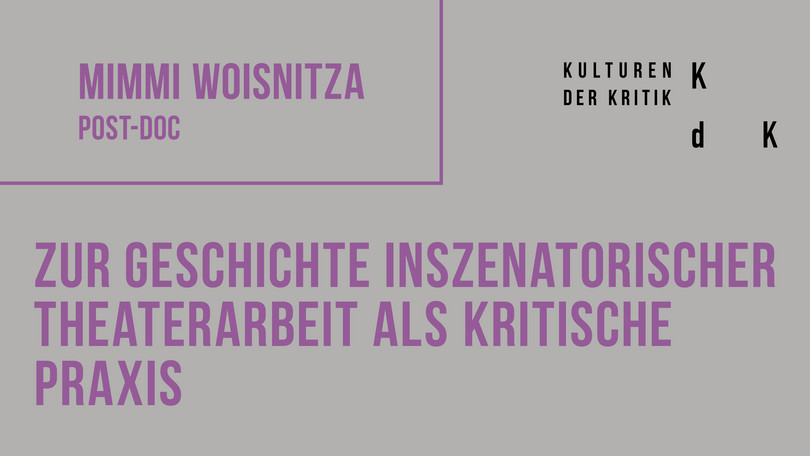Post-Docs
Contact: lukas.betzler@leuphana.de
‚Cultural Aspects of National Socialism‘. Rekonstruktion eines unvollendeten Projekts des Instituts für Sozialforschung
In meinem Postdoc-Projekt widme ich mich einem unvollendeten Forschungsvorhaben, welches das Institut für Sozialforschung (IfS) in den Jahren 1940 und 1941 im New Yorker Exil unter Leitung Max Horkheimers konzipierte. An dem intern als „German Project“ oder auch „Deutschlandprojekt“ bezeichneten Plan einer Studie zur Vor- und Frühgeschichte des Nationalsozialismus waren sämtliche Institutsmitglieder beteiligt. Der Plan blieb jedoch unausgeführt, weil der Antrag – es war der erste Drittmittelantrag, den das IfS stellte – von der Rockefeller Foundation abgelehnt wurde. Das research proposal mit dem Titel „Cultural Aspects of National Socialism“ sowie unzählige drafts und weitere Vorarbeiten sind unveröffentlicht und in verschiedenen Archiven erhalten – insbesondere im Max-Horkheimer-Archiv in Frankfurt am Main.
Mein Forschungsprojekt macht dieses einzigartige, in der Forschung bisher jedoch kaum beachtete Material – insgesamt etwa 2.000 Blatt – zum Gegenstand einer drei Ebenen umfassenden Untersuchung: Praxeologisch rekonstruiere ich am Material die kollektiven und kollaborativen Arbeitsweisen am IfS; theoriegeschichtlich untersuche ich den in den verschiedenen Arbeitsstadien des Projekts zu beobachtenden Wandel der sozialtheoretischen Erklärungsmodelle für den Nationalsozialismus; und wissenschaftsgeschichtlich untersuche ich das Projekt als Dokument eines transatlantischen Theorietransfers und der Bemühung des IfS, sich unter den Bedingungen des Exils im Feld der amerikanischen Sozialwissenschaften zu etablieren. Auf allen drei Ebenen zeigt sich die wechselseitige Durchdringung des (sozial-)wissenschaftlichen und des politischen Felds: die Abhängigkeit der theoretischen Produktion von konkreten Arbeitsbedingungen, politischen Ereignissen und ökonomischen Machtverhältnissen. Die so gewonnenen Erkenntnisse schärfen den Blick für die gesellschaftliche Lage auch der heutigen sozialwissenschaftlichen Beschäftigung mit dem Nationalsozialismus und seinem Fortleben in der Gegenwart.
Sami Khatib
Aesthetics of the Sensuous-Supra-Sensuous: From the Critique of the Spectacle to Speculative Critique
At the crossroads of deconstruction, aesthetics and media theory, the research project examines the scope and relevance of Marx’s discovery of the topos of the “sensuous-supra-sensuous.” Is there a medium that can present the non-empirical materiality of social relations within capitalism? Medium, here, does not comprise a mediating interstice; rather, it points at a historically specific constellation of space, time, language and technique/technology. The Aesthetics of the Sensuous-Supra-Sensuous pertains to a non-empirical, yet material site in which commodified relations form spatially, temporally, linguistically and technologically constituted images. This mode of becoming-image is not bound to a (self)conscious subject of cognition but opens up research areas that examine unconscious structures within language, politics and economy. In this way, critical concepts such as “commodity,” “spectacle,” and “phantasma” can be grasped as decentered image-productions within the medium of the sensuous-supra-sensuous.
In the winter term 2018/19 Dr. Sami Khatib was guest researcher at the cultural sciences research training group “Cultures of Critique”.
Liquidity: On the Cultural Logic of Governmentality in Contemporary Video Art
This project studies artistic videos and films since 2008 that react to the advancing financialization of the economy on the one hand and to governmental technologies of power (Foucault) on the other. The objects of study are works by artists such as Melanie Gilligan, Allan Sekula, or Hito Steyerl that address the question how capitalism, finance capital, flows of capital, or the global economy can be represented. Each in its own way opposes the assumption that capitalism, as a comprehensive social dynamic, cannot be represented in visual and filmic media and develops strategies for glossing or undermining this unrepresentability: (1) via figurative modes of representation; (2) via structural homologies; and (3) via symptomatic readings of historical formations of capitalism. In a second step, the project describes formal structures in these videos, semiotics or poetics of liquidification, of flow, and gaseousness, that result from shifts in the governmental power structures. It aims to investigate the potential of artistic-critical practices that seek not only to register the cultural logic of recent shifts in economic power structures (discussed under the headings of, for example, late, surveillance, or capture capitalism) but moreover to make them experienceable and thus render them amenable to concise critique in the first place.
The inescapable entanglement of cultural products and financial knowledge would then precisely not end up in lamenting about how critique has “run ot of steam” or become “coopted”. On the contrary: the artistic works studied allow for describing different ways, forms, and formats of critique that on the very basis of the implication of any critical subjectivity with the processes of power aim for an analysis of power that brings out the non-necessity and non-acceptability of specific configurations of knowledge and power or of “regimes of truth” (Michel Foucault).
Care in Crisis. On the Future of the Care Utopias of the Past
In recent years, there has been an increase in diagnoses of crisis that focus on the state of care work. The Care in Crisisproject is concerned with these diagnoses, their historical precursors and the antidotes that the (early) history of feminism developed in response to such experiences of crisis.
The project discusses existing diagnoses of crisis, focusing on the question of which concept of crisis can capture the current upheavals in the field of social reproduction. In order to develop such a concept of crisis, Marxist theories of crisis will be extended. Since the wage labour system is based on unpaid and underpaid care work, economic crises are always accompanied by care crises.
The next step is to examine the symptoms of the current care crisis in Germany. To this end, the project will research and interpret the family, social, migration and health policy reforms of recent years. Which familialising and/or defamilialising measures have been taken? What pro- and/or anti-natalist policies are being implemented? What are the discourses around care work?
Finally, and most importantly, the project is interested in the responses to crisis that feminist history holds in store for similar crises. Historically, feminist movements have resorted to (at least) five different ways of dealing with the experience of a care crisis: 1) They have refused to do care work, for example during the Icelandic women's strike in 1975. 2) They have set up co-operatives for domestic work, such as the Cambridge Cooperative Housekeeping Association (1869 - 1871). 3) They participated in utopian settlement projects, such as the socialist community of Llano del Rio, CA, USA (1914-1917). 4) They have demanded payment for domestic work, such as the international Wages for Housework Movement (1972-1977). 5) They have called for the rationalisation of domestic work, as reflected in the Frankfurt Kitchen by the Viennese architect Margarete Schütte-Lihotzky (1926).
Through five case studies that combine archival work and interviews, the Care in Crisis project examines these responses to crises of care. What impact have these historical experiments and initiatives had on the present? What can we learn from them today?
CV
Liza Mattutat is a philosopher and research associate at the Faculty of Cultural Studies at the Leuphana University of Lüneburg. In 2021, she became a post-doctoral Associate in the Research Training Group Cultures of Critique. Between 2016 and 2019 she has been a PhD student within the same programme. In the meantime, she has had a child and, supported by a scholarship from the state of Lower Saxony, completed her doctoral thesis on feminist critiques of law. This was published in 2022 as Emanzipation und Gewalt. Feministischer Rechtskritik mit Karl Marx, Jacques Derrida und Gilles Deleuze (engl. Emancipation and Violence. Feminist Critique of Law with Karl Marx, Jacques Derrida and Gilles Deleuze) by J.B. Metzler in Stuttgart, Germany. Prior to her time in Lüneburg, Liza Mattutat worked in the Junior Research Group Beyond a Politics of Punishment in 2015-2016 at the University of Kassel. This group problematised the retributive penal and prison system and explored alternative perspectives on justice.
Liza Mattutat's research interests lie in feminist theory and history, philosophy of law and critical theory.
- Dr. Heiko Stubenrauch
Obwohl sie nicht viel verbindet, so verbindet sie doch ihre Kantlektüre. Theodor W. Adorno und Gilles Deleuze behaupten, dass dieser in seiner Kopernikanischen Wende ein Subjekt entwerfe, welches der beruhigenden Selbstgleichheit willen die Fähigkeit zur verändernden Erfahrung der Welt einbüße. Die kritische Philosophie Kants sichere diesen Zusammenhang zwischen identischem Subjekt und unveränderbarem Gegenstand bloß ab, so dass sie die emanzipatorischen Ziele der Aufklärung nicht einzulösen im Stande sei, vielmehr in Konformismus münden müsse. Durch Kants Kopernikanische Wende seien die modernen Kritikbemühungen in eine falsche Richtung geleitet worden; eine Richtung, der sich einzig durch eine Kurskorrektur im Rückgriff auf Kant entgegenzustemmen sei: durch eine Zweite Kopernikanische Wende in der Kritik.
Dass es einer solchen Zweiten Kopernikanische Wende in der Kritik bedarf, darin sind sich Adorno und Deleuze noch einig, wie eine solche Wende genau auszusehen habe, darin weisen die Vorstellungen der beiden Philosophen jedoch stark auseinander und stellen in diesem Auseinanderweisen meiner Promotion ihre Aufgabe. Es gilt, das weite und unübersichtliche Feld dieser so verschiedenen, jedoch gleichermaßen die Identität des kantischen Transzendentalsubjekts hinter sich lassenden Kritikbegriffe zu vermessen, die Scheidewege zwischen dem negativen Kritikbegriff Adornos einerseits und dem affirmativen Kritikbegriff Deleuzes andererseits zu markieren und ihre Unterschiede als Fragestellungen zwischen einer Negativität des Leidens und einer Positivität des Begehrens, zwischen einer Dialektisierung der Urteilstheorie und einer Abwendung vom Urteilen, zwischen einer Epistemologie des Nichtidentischen und einer Ontologie des Lebens, zwischen einer Forderung nach Transzendenz und einer Affirmation der Immanenz aufzuwerfen.
- Dr. Mimmi Woisnitza
Associated Post-Doc
On the History of Theater Stagings as Critical Practice
The project proposes a shift in perspective from director's theatre, referring to theater productions authorized by a single (around 1900 almost exclusively male) director, to the emergence of theatrical staging as an artistic practice. Such a perspectival shift allows, on the one hand, to consider, alongside the established and institutionalized theater, collective and collaborative theatre forms as well, which attempted to undermine authoritarian power structures politically as well as artistically. On the other hand, the concept of "staging" or “mise-en-scène” as "putting into the scene" emphasizes the social situatedness of both established and marginalized forms of theatre in that it invokes different, closely linked registers, such as the social and political conditions of production and performance, the structure and distribution of artistic work, as well as the means of scenic presentation. In addition, the theater makers' intentions and programmatic concerns come into consideration, namely to frame extra-theatrical objects scenically and thereby make them tangible and visible. Far beyond the aspect of referentiality or mere faithfulness to a dramatic original, the increasing emphasize on “staging” as artistic practice concerns the claim to criticism of theatrical forms. As a criticality of practice, which can be programmatic or immanent, depending on the case, critique is not understood in a purely negative sense, i.e. as a judgment-oriented analysis. Rather, the designing and rehearsal of alternative forms of coexistence as well as artistic working methods and framing procedures, which are characteristic of the staging practices of the theatrical avant-garde, corresponds to an affirmative and creatively oriented, performative concept of critique.
Understood as practices of creative, affirmative critique, theater forms at the time of the historical avant-garde (1905-1927) employ concepts of life as an alternative to the diagnoses of crisis in the wake of industrialization and capitalism, the effects of war, and in the light of increasing nationalism. Regarding the theater, the topos of fusing life and art, which is central to the avant-gardes, concerns the media specificity of theatre as a transitory live-art, and thus goes beyond often-claimed references to existentialism (Kierkegard, Nietzsche), phenomenology (Husserl), or other strands of life philosophy (Bergson, Simmel, Plessner). The programmatic call for a new relationship between life and art is therefore of particular importance for the practice of "mise-en-scène", which implies processes of collective and collaborative vivification. On the basis of three interrelated focal points (humanism, care, technology) the project investigates different forms of this relationship (Max Reinhardt, Asja Lacis, Erwin Piscator).




